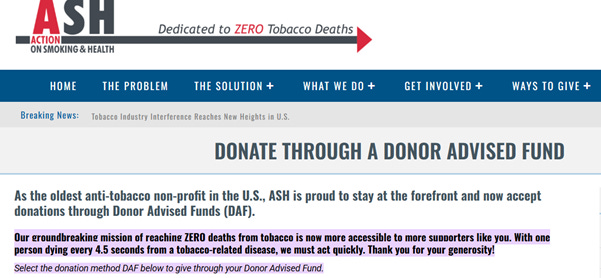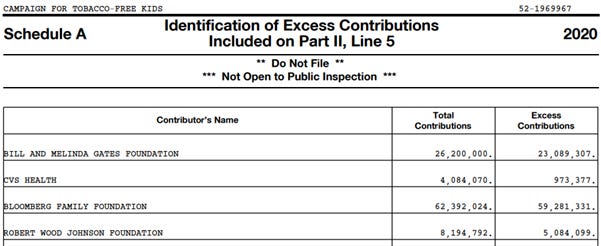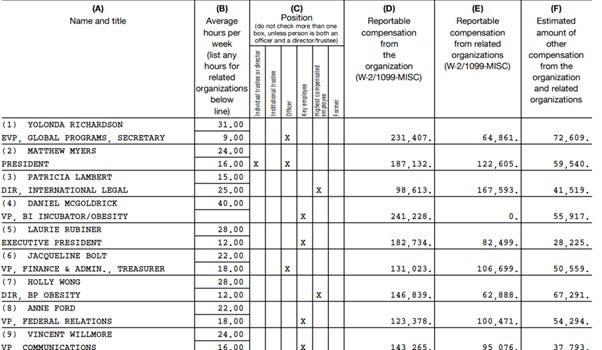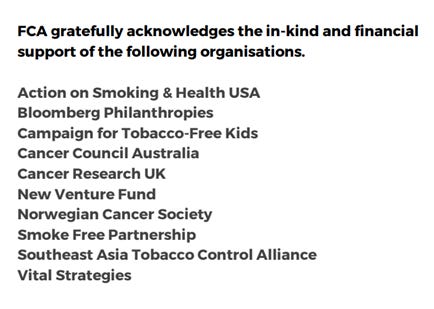Mapping Bloomberg's Billions Against Tobacco Harm Reduction
How Michael Bloomberg Bought Control of the Anti-Nicotine Narrative at the FCTC COP11
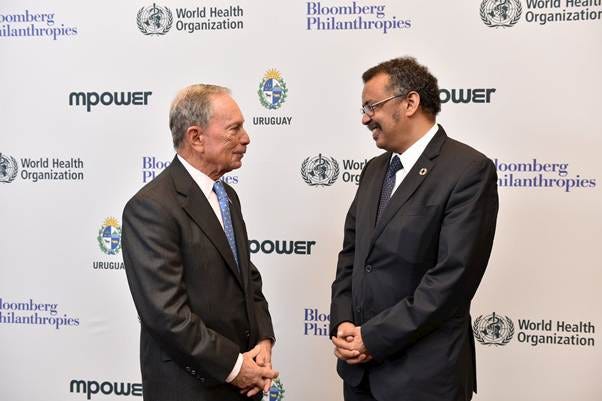
How is it possible for one billionaire to control global public health policy and impose his prohibitionist ideology on billions of consumers with no public discourse or research evidence? Michael Bloomberg’s foundation (and to a much less extent, the Gates Foundation) has invested billions into controlling the narrative against beneficial tobacco harm reduction tools like vaping and nicotine pouches. Through his creation of activist groups, funding health NGOs and large donations directly to the World Health Organization (WHO), Bloomberg has been able to control the agenda and the decisions at the WHO and the Framework Convention on Tobacco Control (FCTC) which is starting his 11th Conference of the Parties (COP) today.
Michael Bloomberg has created a large number of what could be called “Bloomberg Babies” that he has unleashed upon the UN conferences to advance his interests.
This Firebreak investigation looked into the 29 WHO approved civil society organizations admitted to the FCTC COP11. These are the only groups allowed to participate and hold side events for the national delegates. They used to be mostly medical associations, health and cancer research groups, but this is no longer the case. This article will show:
At least 15 of the 29 WHO admitted NGOs to the TCFC were either created by Michael Bloomberg’s foundations, Bloomberg Philanthropies or the Bloomberg Family Foundation, or receive significant funding from his foundations.
Many of these Bloomberg Babies with official UN admitted status work within an incestuous web of campaigns with other Bloomberg-funded projects or organizations. These grants often do not mention Michael Bloomberg as the source.
Many of these US-based Bloomberg Babies (of those that have to declare IRS 990 Form tax declarations) pay each of their top ten directors in the NGOs an average salary exceeding $25,000 a month.
Many of these Bloomberg-funded groups have office and administration costs that exceed their program or grant allocations. Even more curious if you consider how these groups often operate out of the same offices and share staff.
Not only did Michael Bloomberg create a web of NGOs to fund and coordinate with each other, he also divided his donations between two entities, Bloomberg Philanthropies and the Bloomberg Family Foundation. The only reasonable explanation for this is to avoid taxes.
Bloomberg Philanthropies has declared over $1.6 billion in donations to global tobacco control, with hundreds of millions more donated this month for further anti-nicotine campaigns.
A Bloomberg-funded NGO reported that the FCTC has a $27 billion shortfall to fund the implementation of the framework convention’s strategies. These UN framework programs have become entirely dependent on, and beholden to, American billionaire philanthropists.
On top of his 15 NGOs setting the narrative at the FCTC COP11, Bloomberg is also a major direct donor to the WHO and has been rewarded as a WHO Global Health Ambassador.
To put Michael Bloomberg’s influence into context, the WHO’s FCTC published its 2023 Progress Report, recognizing Bloomberg Philanthropies and the Bill & Melinda Gates Foundation for providing considerable financial resources for tobacco control work in the FCTC parties. The FCTC report identified the Bloomberg-funded programs or entities: “The Bloomberg Initiative to Reduce Tobacco Use, Campaign for Tobacco-Free Kids, the Center for Disease Control and Prevention Foundation, the International Union Against Tuberculosis and Lung Disease, Johns Hopkins Bloomberg School of Public Health, the University of Illinois at Chicago, Vital Strategies, and the WHO.”
The total annual budget for the FCTC is under $20 million, with shortfalls because of delinquencies from parties to the convention (ie, the 183 signatory countries). Taking into account the $1.6 billion from the Bloomberg stable of tobacco control campaigns and NGOs, or his co-funding of the WHO’s MPOWER campaign, it becomes patently obvious who is pulling the strings, setting the agenda and defining the narrative at the FCTC.
This is a perfect example of a captured UN organization. If the WHO were to conduct or contract a study on the safety of tobacco harm reduction tools like vaping or nicotine pouches, they would be compelled to first go to academic institutions and organizations funded by Michael Bloomberg. Bias built by the billions into the system.
The loudest cry coming out of the FCTC press office, and their stable of Bloomberg-funded NGOs, is that the tobacco industry is investing millions of dollars into marketing tobacco and nicotine products. They argue then that anyone within three degrees of relation to someone working in these tobacco-related businesses, consultancies or think tanks is not allowed to attend or influence parties to the FCTC.
It might be less concerning if Bloomberg’s billions were spent on scientifically sound programs but his dogmatic fundamentalism against tobacco harm reduction, dutifully echoed in all of his NGOs, is costing lives and destroying the reputation of the WHO. Several Bloomberg Babies like Vital Strategies and the Campaign for Tobacco-Free Kids pushed hard to ban the sale of e-cigarettes in countries like Mexico, India and the Philippines despite evidence of their success as smoking cessation strategies. The Bloomberg NGOs that push for higher tobacco taxes have created a boom for black markets and poor quality control.
What follows is a review of the 15 Bloomberg Babies (in alphabetical order) that are the more active of the 29 civil society organizations allowed to attend this week’s FCTC COP11. Each of them is involved in many of the side events. It should be noted that there are many more anti-nicotine organizations, projects, campaigns and academic institutions funded under the Bloomberg Initiative to Reduce Tobacco Use.
American Cancer Society
The American Cancer Society (ACS) Cancer Action Network is supported by a broad group of funders, including Bloomberg Philanthropies via the Campaign for Tobacco-Free Kids and the Gates Foundation. In 2019, the ACS announced a $160 million campaign with Bloomberg Philanthropies to combat the rise in e-cigarette use by attempting to ban vaping flavors.
Action on Smoking and Health (ASH)
While ASH is registered as an NGO, it does not state the names of its donors in its 2023 IRS Form 990. In any case, it is known that ASH partnered with Bloomberg Philanthropies and the Bill & Melinda Gates Foundation to create a global fund to help low and middle-income countries defend their tobacco control laws against legal challenges from the tobacco industry.
More curious, the NGO actively promotes the non-transparent donor-advised funding scheme. When a campaign group is active in an issue field with a multitude of special interests, it should know better than to leave its funding disclosures in the dark.
African Tobacco Control Alliance (ATCA)
The African Tobacco Control Alliance (ATCA) received grants from organizations like the Campaign for Tobacco-Free Kids to support its tobacco control initiatives.
For projects like the African Tobacco Control Consortium (ATCC) project, the Bill and Melinda Gates Foundation provided a grant from 2009-2013 administered by the American Cancer Society (ACS).
The Campaign for Tobacco-Free Kids
The Campaign for Tobacco-Free Kids and the Tobacco-Free Kids Action Fund claim to be the “leading advocacy organizations working to reduce tobacco use and its deadly consequences in the United States and around the world.” The NGO received over $62 million in contributions from the Bloomberg Family Foundation (and $26 million from the Gates Foundation) in their last published IRS 990 Form for 2020 (see table below). Together with Vital Strategies, they manage the granting of the funds from the Bloomberg Initiative to Reduce Tobacco Use.
Even more interesting is the salary that the top directors of Bloomberg-funded campaign organizations pay themselves. In the same IRS 990 Form for 2020, we can see how the directors at the Campaign for Tobacco-Free Kids are all pulling in more than $25,000 in compensation per month.
As Bloomberg likes to create and fund complicated networks of organizations, there is not one, but two “Tobacco-Free Kids” organizations. The Campaign for Tobacco-Free Kids is a 501(c)(3) nonprofit organization. The Tobacco-Free Kids Action Fund is a 501(c)(4) nonprofit organization separate from, but affiliated with the Campaign for Tobacco-Free Kids. How are they different?
The Tobacco-Free Kids Action Fund describes the distinction:
“Most notably, while the Campaign is limited in the amount of lobbying it can do to promote effective legislation to prevent and reduce tobacco use, the Action Fund may do as much lobbying as it chooses (and its resources allow). ... the Action Fund may, with some limits, educate the public about the tobacco control policies and voting records of different candidates, evaluate the tobacco control votes and policies of competing candidates, and, in some state and local elections, even support or endorse specific candidates, depending on state and local election laws.”
And therein lies the political nature of this group that has done so much damage in vilifying vaping, sending confusing messages on the safety of e-cigarettes and spreading so much misinformation on flavorings. They hide behind their “protect the children” line to cover up a full-out campaign against the harm reduction benefits of these effective tobacco cessation products.
One little detail. The address of the Campaign for Tobacco-Free Kids office is at 1400 I (Eye) Street NW in Washington. At this same office, we find other Bloomberg Babies like the Tobacco-Free Kids Action Fund, the Global Health Advocacy Incubator, Vital Strategies and the Tobacco Control Grants Program. That these are independent groups with different objectives outside of other Bloomberg-funded operations is a pure charade.
The landlord of 1400 I (Eye) Street NW lists 163 employees working for the Campaign for Tobacco-Free Kids. We can only assume that includes all of the other campaign groups sharing the common spaces.
Coalición América Saludable / Healthy Americas’ Coalition
The Coalición América Saludable is involved in a wide variety of NCD campaigns (obesity, alcohol, tobacco). The Coalición América Latina Saludable’s tobacco campaign funding comes from the Robert Wood Johnson Foundation, Global Health Advocacy Incubator and the Campaign for Tobacco-Free Kids.
Here is a good example of how the Bloomberg funding ecosystem wastes so much money on activists who have forgotten how to campaign. The Bloomberg Family Foundation, under Bloomberg Philanthropies, funds the Bloomberg Initiative to Reduce Tobacco Use that then funds the Campaign for Tobacco-Free Kids. The Global Health Advocacy Incubator (GHAI) is an initiative of the Campaign for Tobacco-Free Kids. The Campaign for Tobacco-Free Kids gives funds to GHAI to make a grant to the Coalición América Saludable that uses whatever is left of the original donation (once each Bloomberg-funded group takes their administration fees off the top), to run the Coalición América Latina Saludable’s tobacco campaign.
What is the method to this madness? None of these groups would ever dare speak out against the political interests of Michael Bloomberg by, for example, promoting vaping or nicotine pouches as effective tobacco cessation strategies. Bloomberg, through a brilliant web of collusion, has bought wide swathes of subservience.
Corporate Accountability International
Corporate Accountability International identifies itself as social justice freedom fighters or mercenaries at war against corporations in a wide range of industries. Cutting their teeth campaigning against baby formula companies (as Infact), they transitioned to where the money is with the campaigns against Big Tobacco.
They are an enforcer NGO – attacking industry where they can – so they partner with anti-tobacco NGOs as well as climate, chemicals and food campaigners … Corporate Accountability International define their objectives with a revolutionary zeal:
To build a united front powerful enough to take on the most dangerous transnational corporations in the world, we partner with a broad range of organizers, activists, public officials, community groups, national nonprofits, international NGOs, and more. And because communities that face profound corporate abuse are essential in leading the transformation of our world, we prioritize organizing with people who bear the brunt of corporate abuse: women, people of color, people in the Global South, indigenous people, youth, and low-income communities around the world.
Not only is this rottweiler NGO funded by Bloomberg Philanthropies, they received the Bloomberg Award for Global Tobacco Control in 2012.
As radical as this NGO is, they have managed to become admitted partners to a wide range of UN organizations, maintaining an official status with:
The World Health Organization
The Secretariat of the Framework Convention on Tobacco Control
The United Nations Economic and Social Council
The United Nations Framework Convention on Climate Change
Here though, the hypocrisy gets really rich. Corporate Accountability International will slam industry for its greed and corruption, but when it come to their own books, their accounting gets rather curious. According to their latest accounts, of the $8.9 million in operating expenses, $5.6 million goes to staff salaries plus $0.6 million to consultants with only $1 million going to grants and other programs.
When corporations profit off of others, it is industry greed and corruption. When senior staff at Corporate Accountability International line their pockets with six figure salaries, that is social justice.
European Network for Smoking and Tobacco Prevention
The European Network for Smoking and Tobacco Prevention is a European umbrella group that receives large grants from the European Commission. In the case of one competition, they were the only bid in a three million euro tender to “support the implementation and development of policy and legislation, review the existing tobacco control laws and lay the groundwork for new laws.” A Bloomberg Baby, Vital Strategies, is a partner in this project and will no doubt campaign to make Europe vape-free by 2030.
Bloomberg Philanthropies has also funded organizations that work within the European Network for Smoking and Tobacco Prevention. The Smoke Free Partnership (SFP) received a Bloomberg grant in 2014 to build capacity in tobacco taxation in Europe (see the SFP’s 2014 annual report).
This Bloomberg grant to the Smoke Free Partnership was to “train tobacco control advocates and government representatives on the complexities of tobacco taxation in Europe”. This way, American activists within the Bloomberg tobacco control ecosystem could better intervene in European government fiscal policies.
Global Alliance for Tobacco Control (formerly Framework Convention Alliance)
The Framework Convention Alliance (FCA) was created in 1999 and is made up of hundreds of organizations from over 100 countries. In 2022, they rebranded themselves as the Global Alliance for Tobacco Control (GATC). GATC works on the development, ratification, and implementation of the Framework Convention on Tobacco Control.
The GATC is focused on addressing the significant global funding shortfall for tobacco control, which is estimated to be over $27 billion, to help, they argue, to fully implement the WHO FCTC.
In 2012, Bloomberg committed $220 million to FCA but this is clearly not enough. What is interesting is that, in 2019, FCA claimed financial support from ten organizations (see image below), six of which receive substantial Bloomberg funding. GATC (FCA) is, by definition, a Bloomberg Baby.
While the financial data is only available upon request, it should be noted that the new organization has a central staff of only two people with six regional coordinators. Their latest annual report, for 2022, did not include any financial information.
Addendum November 18, 2025: Having just received the FCTC COP11 participant list, I could not help but notice that the Global Alliance for Tobacco Control, that employs two people and six regional coordinators, was allowed to bring 61 delegates to COP11. The WHO’s restrictive policies toward non-state delegates does not seem to apply to Bloomberg Babies.
InterAmerican Heart Foundation
The InterAmerican Heart Foundation focuses on all issues related to heart health. They also claim to work with the Campaign for Tobacco-Free Kids, which, as a Bloomberg regranting NGO, implies that they receive funding for their tobacco control campaign.
International Union Against Tuberculosis and Lung Disease (The Union)
The Bloomberg Initiative to Reduce Tobacco Use Grants Program is jointly managed and run by The International Union Against Tuberculosis and Lung Disease (The Union), Vital Strategies and the Campaign for Tobacco-Free Kids. While the title suggests that “The Union” is a medical association, it seems to serve primarily within the Bloomberg regranting ecosystem. They used Bloomberg funds to support a briefing paper by the NCD Alliance (see below).
NCD Alliance
The NCD Alliance participated in the Resolve to Save Lives campaign, an initiative of Bloomberg’s Vital Strategies. They also acknowledged $225 million in grants from Bloomberg Philanthropies, the Bill & Melinda Gates Foundation and Gates Philanthropy Partners.
With the support of the Framework Convention Alliance (Bloomberg money) and the International Union Against Tuberculosis and Lung Disease (Bloomberg money), the NCD Alliance published a briefing paper on tobacco control.
Southeast Asia Tobacco Control Alliance (SEATCA)
Bloomberg Philanthropies established a tender process for its STOP campaign, to set up a tobacco watchdog organization. The condition was that the bids needed to have three members, with at least one coming from a low or middle income country. It should come as no surprise that the winning bid included two Bloomberg Babies and the Southeast Asia Tobacco Control Alliance (SEATCA) based in Thailand. SEATCA set up the Global Centre for Good Governance in Tobacco Control (GGTC) with the Thammasat University’s School of Global Studies in Thailand.
The GGTC was joined in this winning bid by the Tobacco Control Research Group at the University of Bath (see below), which hosts tobaccotactics.org, a tobacco industry watchdog site and the International Union against Tuberculosis and Lung Disease (The Union) along with its sub-grantee Vital Strategies (so actually three Bloomberg Babies).
The tobacco control world is so small that most bids for a new tobacco watchdog campaign organization were probably stacked with Bloomberg Babies.
The Tobacco Control Research Group (TCRG)
The University of Bath set up the Tobacco Tactics website with funding from Cancer Research UK and Bloomberg Philanthropies. Before that, the research had previously received funding from the New Venture Fund, Smokefree South West, and the Economic and Social Research Council (ESRC) Knowledge Exchange Opportunities scheme.
It should be noted that the New Venture Fund is a fiscal sponsor, meaning they receive foundation funding to establish new campaigns that look and act like grassroot NGOs (but are controlled directly by the supporting foundations working behind the scenes). Bloomberg Philanthropies has worked with fiscal sponsors in the past to start up activist groups (eg, Beyond Plastics or Beyond Petroleum) so it would likely have been an early engagement to work with the University of Bath via this fiscal sponsor, the New Venture Fund.
But then the Bloomberg funding got serious. Bloomberg Philanthropies created the University of Bath’s Tobacco Control Research Group (TCRG). Bath received an $8.9 million grant from Bloomberg for work from 2023 to 2026. This is on top of the funding the University of Bath received to work with the global tobacco industry watchdog STOP.
Great, Michael has spawned a new generation of tobacco control activists giving each other PhDs for their pseudo-research.
As an interesting aside, the Tobacco Control Research Group is not a legal entity (not an NGO or a registered organization). It acknowledged in its FCTC COP 11 accreditation application that it is merely a “research group” at the University of Bath. The FCTC prides itself on its strict control of who can and cannot be allowed to attend its conferences or meetings (I applied to COP11 and was rejected). But then the FCTC accepts an academic group that has no legal standing or accountability (no transparency, no published accounts, no official status outside of its fiscal sponsor). I suppose Michael Bloomberg told the FCTC to fall in line. As mentioned above, Bloomberg Philanthropies often funds groups via fiscal sponsors that have no need for legal status or accountability (see the Firebreak exposé on Beyond Plastics).
Smoke Free Partnership (SFP)
As mentioned above, the Smoke Free Partnership (SFP) was awarded a grant in 2014 to build capacity in tobacco taxation in Europe (see the SmokeFree Partnership’s 2014 annual report).
Vital Strategies
Vital Strategies jointly manages the Bloomberg Initiative to Reduce Tobacco Use grant program with the Campaign for Tobacco-Free Kids. It also receives Bloomberg funding for their own NCD campaigns.
The hypocrisy of this group’s anti-vaping campaign is significant. Vital Strategies promotes harm reduction in its drug addiction campaigns – investing in naloxone, safe consumption sites, and drug-checking tools. But then it lobbies to ban harm-reduction tools for tobacco.
Vital Strategies is mostly funded by the Bloomberg Family Foundation (see the 2023 IRS 990 form below).

When we look at their director compensation packages, perhaps the NGO should be called Vital Hypocrisies. Like other Bloomberg Babies, the top ten directors at Vital Strategies earn more than 25K per month and their salary allocation accounts for 23% of the NGO’s $70 million in 2023 revenue.
Given that Vital Strategies is responsible for regranting most of its funds to other organizations in the tobacco control field, paying themselves almost a quarter of all of the grants they received comes across as, well, lavish.
More to Come
This month, Bloomberg Philanthropies and the Bill & Melinda Gates Foundation announced a new $375-million joint commitment to fight tobacco (especially in developing countries). Bloomberg is committing $250 million over four years while the Gates Foundation will spend $125 million over five years.
This money will likely go into the creation of new Bloomberg Babies to broaden the campaign ecosystem and expand Michael Bloomberg’s influence in tobacco control, while continuing to control the FCTC agenda and driving the anti-nicotine narrative. It is amazing how this funding dwarfs the funds available for the pro-vaping lobby (see image below), and still people are choosing to vape rather than continue smoking.
Maybe all the money in the world does not make a damn of difference if your arguments are weak. The answer for Michael Bloomberg is not to listen to reason but just write another check.
One last point, as a Ukrainian-Canadian peasant, that I just have to get off of my chest. I get that a group of billionaires are leaving each of these intertwined NGOs hundreds of millions of dollars each year with little scrutiny. And I get human nature means that these activists will use their good fortune to enrich themselves first with lucrative salaries. But after 20 years of FCTC campaigning against tobacco and nicotine products, you would think that these billions spent by Bloomberg Baby NGOs would have achieved something other than a group of nagging ninnies meeting periodically to gripe about industry wealth.
What a waste of philanthropy!
The 14 admitted NGOs with UN official status to the FCTC COP11 that have no recorded funding from Michael Bloomberg include: Cancer Research UK, FDI World Dental Federation, World Heart Federation, World Federation of Public Health Associations, World Medical Association, Vision mondiale de la santé, Union for International Cancer Control, Tobacco Free Portfolios (TFP), International Pharmaceutical Federation (FIP), International Pharmaceutical Students’ Federation, International Alliance of Women, International Council of Nurses, International Federation of Medical Students’ Associations, International Network of Women Against Tobacco.



